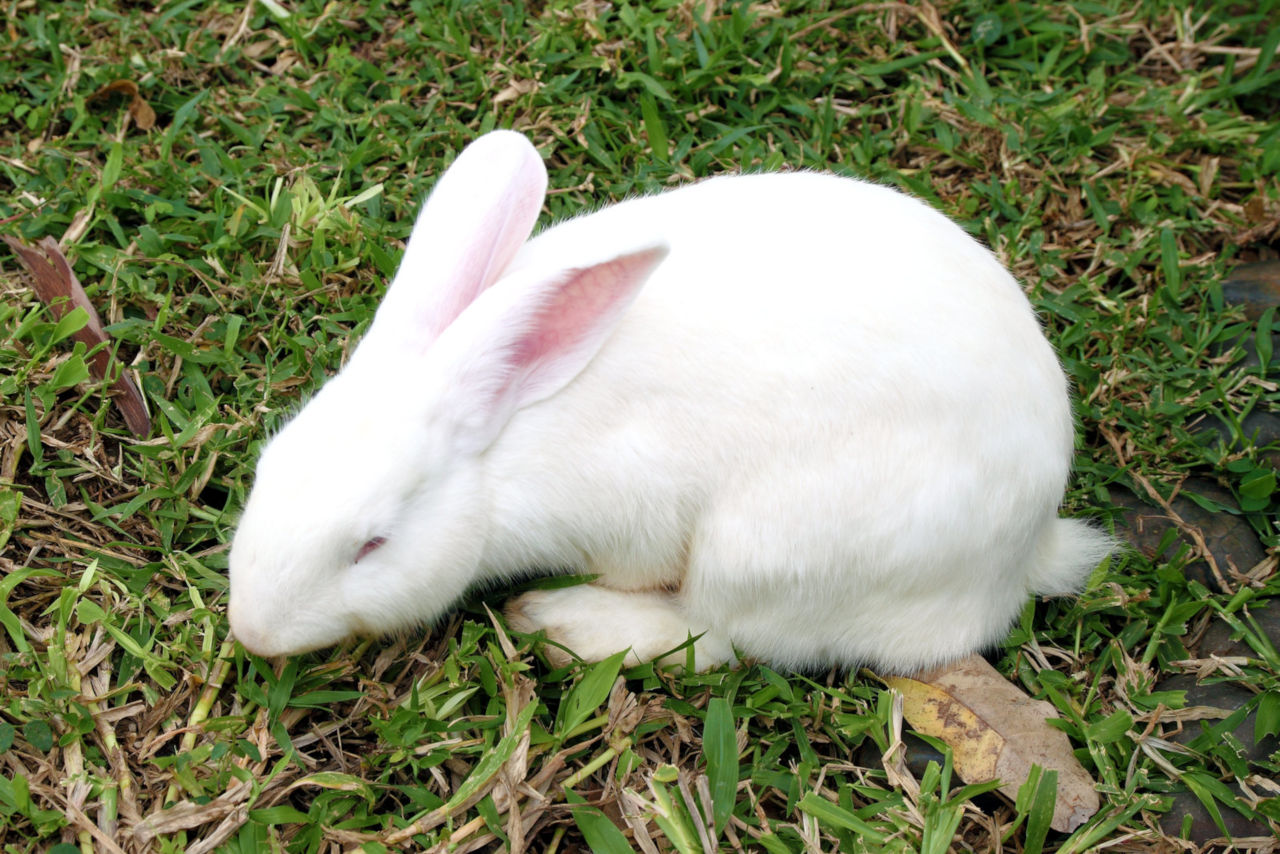Fresh vegetables are a great addition to a rabbit’s diet. Rabbits get most of their nutrition from hay and pellets, but fresh vegetables are a treat for them. Peppers are among the tastiest vegetables around. But can rabbits eat peppers?
Peppers, whether yellow, green, or red, are a delicious treat for rabbits that is good for their health. This colorful vegetable contains many vitamins, minerals, and antioxidants. However, it would be best if you did not offer your rabbits too many peppers too often. And don’t feed hot peppers to rabbits at all, as they cannot process hot and spicy foods.
Of course, peppers alone are not enough to feed a rabbit. You should only provide them in tiny and limited quantities.
You must also remove the core and seeds from the peppers before feeding them.
Below, you will learn more details on how to feed peppers to your rabbits. We also address the health benefits and dangers associated with rabbits and peppers.
Can Rabbits Eat Peppers?
Bell peppers are suitable for rabbits. This vegetable is an excellent addition to a rabbit’s regular diet.
Your pet will benefit from several health benefits. Rabbits often do not get enough vitamins naturally, so peppers help compensate for this deficit.
However, peppers should not cover the bulk of your rabbit’s diet. An over-supply of specific vitamins is equally bad as a deficiency.
Fresh vegetables and fruits should never exceed 15% of a rabbit’s diet. And even within that proportion, there should be some variety.
Health Benefits of Peppers for Rabbits
Bell peppers are 92% water. This means they help keep your rabbit well-hydrated even in hot weather.
They also contain trace amounts of fiber, which promotes a healthy digestive tract in your rabbits.
In addition to these essential health benefits, peppers are packed with many good nutrients.
Some of the vitamins and minerals found in peppers include:
- Vitamin A: It improves your rabbit’s vision and promotes healthy teeth and bones.
- Vitamin C: Rabbits don’t really need vitamin C. However, it promotes healing if your rabbit has injured its skin.
- Vitamin B6: This is key to your rabbits’ metabolism. Vitamin B6 helps them digest food and maintain a healthy weight.
- Vitamin E: Rabbits depend on solid muscles to move, especially in their legs. Vitamin E plays a crucial role in keeping their muscles supple.
- Vitamin K1: A rabbit deficient in vitamin K1 can become anemic, that is, suffer from blood deficiency. This is dangerous because rabbits are already small and delicate.
- Potassium: Potassium is essential for the rabbit’s muscles and nervous system. They need potassium more than any other mineral.
- Manganese: Manganese helps rabbits grow and maintain strong, stable bones.
- Omega-3 and omega-6 fatty acids: Omega-3 and omega-6 fatty acids are helpful for the rabbit’s brain and keep joints supple.
Bell peppers are also rich in antioxidants that reduce the risk of arthritis and cancer in older rabbits.
Different types of peppers have different strengths and different amounts of certain nutrients.
Therefore, it is best to vary the colors of the peppers you feed. This way, your rabbit will enjoy a wide range of benefits.
Can Rabbits Eat Green and Red Peppers?
Peppers of all colors are healthy for rabbits. So, the same goes for red and green peppers. These vegetables have a spicier flavor than their yellow or orange counterparts.
Peppers are among the officially approved vegetables for rabbits. So you can feed them without hesitation. But do so only in moderation.
Also, remember that portion size is critical. A rabbit weighing 4 pounds (2 kg) should only eat about 30 g of fresh food daily.
This should include a variety of vegetables and fruits, not just peppers.
Can Rabbits Eat Yellow Peppers?
Yellow and orange peppers are safe for rabbits. Despite their sweeter taste, they do not contain sugar or excessive calories.
You may find that your rabbit prefers yellow and orange peppers. This is because a rabbit’s palate perceives and enjoys sweetness.
However, this also means that you need to be careful with sweet peppers in rabbits.
Rabbits are comparable to dogs when it comes to begging for food. They will beg for it mercilessly if they know a bell pepper in the house.
Do not give in to this begging. You have to be strict about feeding fresh food to rabbits. Too much of it can lead to stomach upsets in rabbits.
Can Rabbits Eat the Seeds of Peppers?
When feeding peppers to your rabbits, it is best to remove the seeds first.
While these components are not toxic, they also provide no benefit to the rabbit. All the good stuff is in the pulp.
Rabbits like to gnaw and chew on the seeds of a bell pepper. However, it takes them some time to break them down. This is positive, as it allows them to grind down their teeth.
However, your rabbit may also swallow the seeds. They are not poisonous and are small enough to be excreted in the feces.
However, there is always the risk of your rabbit choking or breaking a tooth.
So, there are no benefits to giving your rabbit the seeds of the peppers. Therefore, you should always use the pulp of the peppers.
Can Rabbits Eat Bell Pepper Leaves?
Bell peppers belong to the nightshade family. For most animals, the leaves of these plants are poisonous.
Therefore, never feed bell pepper leaves to your rabbit. You should even fence off the area if you grow peppers in your garden.
Some rabbits can eat the leaves without any problem, even if they have no taste. However, it is more likely that they will get sick.
Can Rabbits Eat Hot Peppers?
Spicy and fiery foods cause stomach upset in rabbits.
Also, rabbits are physically unable to vomit. Hot peppers damage rabbits’ intestines until they are expelled, causing pain and discomfort.
No one knows for sure if rabbits can taste the spiciness in food. In many ways, however, it doesn’t matter.
Just the smell of hot peppers or something similar should keep a rabbit away.
The odor that will deter your rabbit is capsaicin. This compound is found in all hot peppers and chili peppers.
Some farmers even scatter cayenne pepper and similar products that contain capsaicin to keep rabbits off their land.
If a rabbit can overcome its aversion to the smell, it might chew on a hot pepper.
They probably enjoy nibbling their way through the thick, waxy flesh. It doesn’t agree with them at all, though.
Should I Give My Rabbits Cooked Peppers?
Rabbits should only eat their vegetables raw and fresh, not cooked.
There is always a risk that your rabbits will burn their mouths on cooked food.
Wild rabbits and hares will only eat raw food. Rabbits don’t know that you must blow on the food or wait for it to cool.
Cooking peppers also destroys many nutrients. Cooking them is counterproductive since they are healthy for rabbits primarily because of the nutrients.
By doing so, you are depriving your rabbits of the many health benefits of peppers.
Cooked food is also much softer than fresh produce. This is another thing your rabbits cannot understand. They will bite into the peppers, expecting them to be hard and crunchy.
Since rabbits have solid teeth and jaw muscles, they could hurt themselves in the process. If they bite hard, they will easily bite through the bell pepper. This can cause them to bite their lip.
A bitten lip is also an open wound in rabbits. At best, this is painful and keeps them from eating. At worst, it becomes infected and needs to be treated.
Can Rabbits Eat Expired Peppers?
While cleaning out your refrigerator, you may come across peppers that have expired dates.
You may then think that yes, you can still feed them to your rabbits to avoid waste.
But this can be dangerous. Rotten fruits and vegetables often contain mold that is invisible to the naked eye. Mold can be deadly to rabbits.
However, if the expiration date is only just past, the peppers are probably safe to eat. However, never feed your rabbit anything you wouldn’t eat yourself.
Also, regularly check your rabbit’s enclosure for uneaten peppers or other fresh foods.
If your rabbit does not eat the peppers the same day, throw them away.
How to Get Your Rabbit Used to Peppers
It would be best if you did it gradually when you want to introduce a new food to your rabbit’s diet. You need to make sure that your rabbit is not intolerant.
Cut out the core and seeds from the bell pepper. Then, cut off a small piece of the flesh.
Offer this small piece to your rabbits as a treat; wait for 48 hours after they are it.
This is enough time to determine if they can adequately handle the peppers.
If a rabbit has an upset stomach during that time, it probably can’t tolerate peppers. If not, it can handle peppers.
Rabbits cannot feed on peppers alone, however. Never put a whole bell pepper in the cage. Your rabbit will happily eat them but will suffer afterward.
Too many vegetables at once will upset a rabbit’s stomach.
Alternatives to Peppers for Rabbits
Consider an alternative if you don’t want to or can’t give your rabbit peppers. Recommended vegetables for rabbits include:
- Celery
- Spinach
- Zucchini
- Broccoli
- Kale
- Cauliflower
- Asparagus
- Brussels sprouts
You may notice that carrots are not on this list. Even if the stereotypes are true and rabbits like carrots, you must feed them sparingly.
Carrots contain a lot of sugar. While they offer the same satisfying crunch as peppers, they are not a healthy alternative.
Conclusion: Are Rabbits Allowed to Eat Peppers?
Peppers are a valuable addition to a rabbit’s diet when fed in moderation. The long list of nutrients speaks for itself.
Rabbits that enjoy an occasional piece of bell pepper will hopefully enjoy excellent health. At the very least, they are getting plenty of good nutrients.
Just make sure the peppers are ripe and appropriately hard. Remove the seeds in case your rabbit swallows them. Cut them into small, bite-sized pieces.
Vary the colors of the peppers as well, as they contain different nutrients. This way, you can give your rabbit an exciting and fun feast.
Of all the fresh vegetables available to rabbits, peppers are probably the best choice.
Lettuce and carrots may be considered rabbit food, but peppers are more deserving of that designation.


